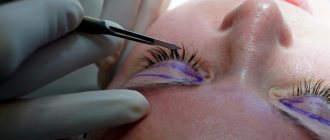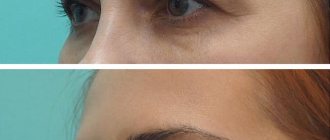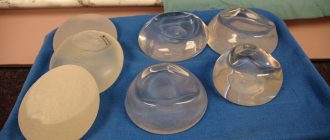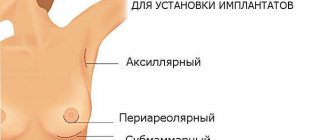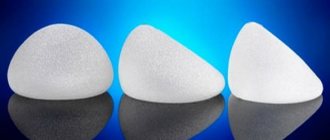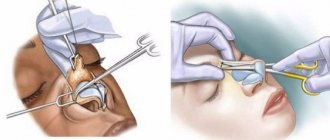Lipofilling is a very popular procedure that allows you to enlarge your breasts by 1-1.5 sizes without unnecessary injuries and with a short recovery period. This effect is achieved by injecting the patient’s own fat tissue, purified of impurities. This correction method is optimal for women who want to slightly enlarge their breasts, but do not want to use foreign bodies (implants) for this.
Although formally breast augmentation with fat cells belongs to the field of both plastic surgery and cosmetology, in fact it is a full-fledged operation, which differs from other types of correction by minimizing tissue trauma and a shorter rehabilitation period. Like any plastic surgery, it has its advantages and disadvantages, as well as specific features.
How is the procedure done?
For lipofilling, the patient’s own fat cells are used; in rare cases, donor material can be collected. The first stage of the operation is pumping out tissue for transplantation. Most often, areas with a high content of fat cells are used for sampling, for example, the thighs or abdomen.
After removal, the tissues are placed in a special centrifuge, where they are purified from various impurities such as blood cells. The fat is then filtered and prepared for injection. Some techniques also involve adding growth factors or erythropoietin to the fat emulsion. At the last stage of the operation, fatty tissue is injected into the corrected areas. This method can be used to correct not only the breasts, but also other areas - for example, the face or buttocks.
After the operation, no stitches are required, since both cell collection and injections are carried out not through large incisions, as when installing implants, but through small punctures. For collection and insertion, a special cannula with a rounded end is used, which ensures minimal trauma to tissues and blood vessels.
Methods for collecting and processing fat
Fat is collected using a multi-channel cannula connected to a standard linear aspirator. Typically a cannula with multiple holes is used.
The fat is then transferred into 60 ml syringes, which are loaded into a sterile centrifuge with a low speed bucket handle. The centrifuge rotates for 2-3 minutes, resulting in approximately 20-40 fat.
About 15-20% of the additional crystalloid fluid is removed. The result is a less concentrated fat that is not very thick and is ready for injection.
Low force centrifugation results in low concentrated fat that can be easily injected into the pre-expanded breast.
The goal of fat injection should be to accurately distribute fat throughout all layers of the breast.
Advantages of the technique
Lipofilling has a number of advantages. The most important and significant advantage of this technique is its safety. An implant is a foreign body for the body and, although modern products are distinguished by high hypoallergenic properties, in rare cases individual intolerance and, as a result, implant rejection can occur. From the body's point of view, fat tissue is not a foreign body, so no time is required for acceptance - the cells are immediately accepted by the body as their own.
This is where the next advantage comes from: speed of recovery. Minimal punctures during surgery and “native” tissue provide a very high healing rate. Accordingly, the rehabilitation period is much shorter than with other types of plastic surgery.
The doctor gains access to the working area in the same way as when working with implants - through the armpit, in the fold under the breast, between the areola and the nipple, along the edge of the areola. But due to the small size of the punctures, there are no noticeable scars left after the operation.
Plastic surgery
ANATOMY OF THE BREAST
The mammary gland consists of fibrous, glandular and adipose tissue. In the depths there are nerves, ducts, blood vessels, and adipose tissue. And under the mammary gland is the pectoralis major muscle, which provides movement of the upper limb. Let's look at the most common methods of performing this operation.
SKIN CUT OPTIONS FOR IMPLANT INSTALLATION
When performing breast augmentation surgery , an incision is usually made in one of 3 areas: around the nipple (periareolar approach), in the fold under the mammary gland (inframammary approach) or in the armpit (transaxillary approach).
As a rule, during such operations the incision is performed according to 1 of three schemes:
- Periareolar access – around the nipple. The advantage is the maximum possibility of hiding the incision site. But there is a risk of loss of nipple sensitivity.
- Transaxillary access – in the armpit. The incision site will be more visible. This method is used when the patient does not want to have any scars in the mammary glands.
- Inframammary access - under the breast. A very popular option, since the cut line is located in a natural fold and is almost invisible.
Before the operation, the plastic surgeon at our clinic will tell you in more detail about the features of each incision and help you choose the best option for you.
IMPLANT INSTALLATION
When breast augmentation occurs , implants are installed:
- Under the mammary gland on top of the muscle layer - subgular arrangement. The duration of the operation and recovery period are minimal. However, if the dimensions of the implant are chosen incorrectly, its edges will stand out under the skin. This arrangement also makes it difficult to visualize breast tissue on a mammogram.
- Under the muscles of the chest wall there is a submuscular type location. In this case, the possibility of palpating the implant through the skin is reduced, and the risk of scar tissue compacting around it is reduced. Also, this method of placement allows you to get a better picture of breast tissue on a mammogram. The disadvantage is the long duration of both the operation itself and the recovery period.
You can discuss with the doctor of our clinic which of the above methods will help achieve your goals, and together choose the method that is most suitable in your case.
TYPES OF BREAST IMPLANTS
We use implants manufactured by Arion, Allergan, Mentor, which over the past 4 years have received worldwide recognition as leading manufacturers of this type of product. Arion and Mentor have been leaders in the production of breast implants that meet modern technical standards and quality criteria for many years.
Thus, Mentor offers gel implants made on the basis of a safe and aesthetically pleasing cohesive gel. Fillers are available in the following degrees of cohesion:
- the softest gel filler;
- denser gel;
- gel of maximum density.
Breast implant shape
Anatomical or round shaped implants are available. The type is selected by the patient together with the doctor. Anatomical models have teardrop-shaped contours, they give the breasts a more natural look.
There are models on the market with super high, high, medium and medium+ profiles. The first is an ideal option for ladies with a narrow chest who want to get more convex breasts.
Implant surface
The surface of the implants can be textured or smooth. The shell of the latter is softer, so it is not so clearly palpable through the skin. Arion hydrogel models have proven themselves well. Monobloc CMC products, which are filled with a biocompatible hydrogel, have been produced since 1994.
The filler for such implants is the natural polymer carboxymethylcellulose. This is a completely non-toxic substance that is not carcinogenic and does not cause an allergic reaction. Even if the implant shell is damaged and the hydrogel gets into the tissue, it will turn into water, carbon dioxide and glucose, which will be completely removed from the body.
The consistency of the implant filler is an elastic-viscous gel, very soft to the touch. The elasticity of the ultra-thin shell is 2 times greater than that of conventional silicone analogues. Such models are easier to install through small cuts and much more difficult to damage.
Monobloc CMC does not interfere with breast and chest examinations because it is transparent to X-ray radiation. The shell can be microtextured or textured.
How is breast augmentation surgery performed?
The operation is performed in the surgical department of our center. It is usually performed under general anesthesia and lasts 1-2 hours. The patient can return home on the same day.
The doctor makes an incision and creates a special pocket for installing the implant. Once the insert is placed, the incision is closed and sutures are placed. In order to achieve the best effect and minimize the duration of the recovery period, our doctor will definitely discuss with you the features of the available surgical techniques and suggest the most optimal one for you.
The duration of the recovery period depends on individual characteristics. During the operation itself, you will not feel anything as you will be under anesthesia. But in the first few days, painful sensations are possible. The greatest discomfort is usually recorded during the first 1-3 days after such an operation. There is pain and swelling of the breast.
Despite the great dependence of the recovery period on individual factors, after about a week patients are allowed light physical activity.
An important feature is that after breast augmentation surgery you will need to wear compression garments or a special bra for some time. Such clothing is designed specifically to provide optimal conditions for recovery. The doctor can also give additional recommendations for this period. If any complications occur, you should immediately contact the clinic.
Questions to ask your plastic surgeon:
- How many years does a surgeon perform breast augmentation operations?
- How many breast augmentation surgeries does a surgeon perform each year?
- What are the possible risks and complications associated with having a breast implant installed?
- What methods of breast augmentation are possible in my situation?
- What shape, size and surface of the implant, as well as access and installation options for the implant are recommended in my case?
- How will the surgery affect my ability to breastfeed?
- How can the appearance of breast implants change over time?
- Do you have photos of your breasts before and after surgery? Can I watch them?
FREQUENTLY ASKED QUESTIONS ABOUT BREAST IMPLANTS
What is silicone?
Silicone is obtained from silicon, a metal-like substance that in nature combines with oxygen to form silicon dioxide or silica. Silica produces sea sand, crystals and quartz. Silica is the most abundant substance on Earth. When silica is heated in the presence of carbon at high temperatures, silicon is formed. Further processing of silicon produces a polymer called silicone, which can be a liquid, gel, or rubber-like substance. Various modifications of silicone are included in lubricants and oils, silicone rubber. Silicone is an ingredient in a number of products that are widely used in everyday life, such as varnishes, suntan lotions and hand lotions, antiperspirants (anti-sweating products), various types of soaps, groceries, chewing gum, etc.
Are silicone implants safe?
The results of special studies have shown that the silicone content in cow's milk and many popular infant formulas is many times higher than the content in the breast milk of women who have had implants installed. To date, there is no evidence that silicone implants can cause serious illness. Women are constantly in contact with silicone in everyday life. Scar tissue or a capsule usually forms around the implant, which can compress and compress the implant. This condition is called capsular contracture. It often occurs after infections, the formation of a hematoma (collection of blood), and also when the implant is located under the gland. Symptoms of this complication may include the appearance of a seal and a feeling of discomfort, even pain, as well as a change in the shape of the implant and the possibility of its palpation and/or displacement. If severe pain and/or thickening occurs, additional surgical intervention is required. Such an operation may involve removing the capsule tissue, removing and possibly replacing the implant itself. After such additional operations, the re-development of capsular contracture is not excluded. You should also know that performing a closed capsulotomy, i.e. compression and squeezing of the fibrous capsule formed around the implant in order to destroy the scar capsule is not recommended, as this may lead to damage to the implant.
What is the reason for the formation of a capsule around the implant?
When a breast implant is installed, scar tissue forms around its surface and a capsule is formed, which is a natural reaction to the introduction of any foreign body into the body.
Does having an implant affect the risk of breast cancer?
All clinical studies (human studies) have not found any evidence to suggest that implants cause breast cancer.
How do breast implants affect mammography?
The presence of breast implants can make it difficult to detect signs of a malignant tumor during mammography and to conduct the examination itself. Before performing a mammogram, you must inform the specialist conducting the examination about the presence of implants. It may be necessary to use special offset techniques and take additional images in other projections. You should also discuss with your doctor any cases of breast cancer in your relatives, if any.
Is it possible to develop an allergy to silicone?
Allergy development is possible in response to exposure to almost any substance, however, cases of allergy to silicone are very rare. We constantly come into contact with silicone in everyday life. It is found in nail polishes, suntan lotions and hand lotions, antiperspirants (anti-sweating products), soaps, groceries, waterproof coatings, and chewing gum.
What is the average lifespan of implants?
The service life of the implant varies in each specific case. In some cases, the need to replace the implant arises after just a few years, while in other cases, wearing the implant is possible throughout life. Sometimes such an operation is performed due to a woman’s desire to change her breast size or install a different type of implant; sometimes the need to remove and replace the implant is caused by the development of complications such as implant displacement.
How long after implant surgery can I resume exercise and other physical activities?
Your medical plastic surgeon will give you professional advice regarding the length of time you should not work, and how and when you can return to normal activities. Features of the recovery period are individual in each specific case. As a rule, discomfort is most pronounced in the first few days. Return to full activity is usually possible after an average of 4-6 weeks. While the incision is healing, it is important to avoid excessive sweating in this area. In this regard, you should limit physical activity and reduce the frequency of sunbathing until the incision heals and scars. You should not perform any actions with excessive physical stress on the upper shoulder girdle too early. It is necessary to create conditions of rest for the body, which promotes the healing of the incision. It is necessary to strive to reduce the degree of swelling around the implant. After a month, you can take baths, including hydromassage (jacuzzi). In the early period after installation of the implant, you need to ensure that the incision area does not get wet. Be sure to consult with your doctor before returning to work. The recovery period varies significantly in each specific case. Walking is generally recommended to stimulate blood circulation. The larger the installed implant, the heavier the mammary glands will be after surgery. Therefore, after surgery, you should wear high-quality supportive bras in order to minimize the degree of stretching of the skin and the degree of ptosis (drooping) of the breast.
Can I go to a solarium or sunbathe after having an implant installed?
Fake tanning or sunbathing will not affect the condition of the implant, but may worsen the condition of the scars. After surgery, you should avoid exposing the incision area to sunlight or artificial irradiation that causes tanning for at least 1 year, as this may cause permanent pigmentation in the incision area. The implant may become warm and may cool down more slowly than the rest of the body.
Can I fly on airplanes or go scuba diving?
Many women who have had implants go scuba diving and fly on airplanes. In these situations, due to changes in pressure, the implant shell may expand or contract slightly, which can lead to the appearance of small air bubbles inside the implant. These phenomena should resolve on their own within 24-48 hours.
Will the breasts retain normal mobility?
Breast mobility depends on many factors, namely: the type of implant installed, the nature of the incision, the degree of implant healing, the presence or absence of capsular contracture and its degree. For some women, breast implants remain soft and move well, while for others they become firmer and more fixed in position.
Do stretch marks remain on the skin after implant placement?
When installing an implant, traces of tissue stretching may remain, but this is quite rare. If you are concerned about the possibility of stretch marks, you may choose a smaller implant to reduce tissue stretching or a Spectra adjustable volume implant.
What effect does smoking have on the healing process of a scar after surgery?
Smoking causes contraction of blood vessels, a decrease in the amount of blood flowing and oxygen delivered with it to the intervention area. For the healing process, tissues need blood flow and the oxygen it delivers. When blood supply decreases, tissue healing slows down. Doctors advise abstaining from smoking for varying periods of time before and after surgery. According to our data, this period ranges from 1-2 to 5 weeks before and after the intervention. You should ask your doctor how long he recommends not smoking before and after surgery.
Is nipple sensitivity lost?
After surgery to install an implant, the sensitivity of the nipple may change: it is possible to either increase or decrease the sensitivity of the nipple and breast as a whole. These changes can manifest themselves over a wide range: from complete lack of sensitivity to the appearance of increased sensitivity, and can be either temporary or permanent.
Should I be at my ideal weight before implant surgery?
Your weight should be close to your ideal weight. Significant weight loss after implant surgery may negatively affect the results of the intervention. This can lead to the development of ptosis (drooping) and reduction in breast size.
I am 60 years old. Is advanced age a barrier to breast implants?
To perform the operation, good health is important, not age.
What changes occur during pregnancy?
Each woman is individual, and therefore the results of interventions performed both before and after pregnancy are different in each case. During pregnancy, the mammary glands enlarge and undergo all the changes characteristic of this condition. The degree of mammary gland enlargement is different in each case, and its assessment takes into account the volume of installed implants.
Can I breastfeed?
Many women successfully breastfeed their children after having implants installed. The results of modern studies show that the silicone content in breast milk of women who have undergone surgery to install an implant does not differ from its content in the milk of women who do not have implants. However, in some cases, the presence of a breast implant can negatively affect the ability to breastfeed, which is most likely when a periareolar incision is performed. During this period, some women may develop mastitis, an inflammatory process in the ducts of the mammary gland, which can also lead to the formation of capsular contracture. Taking antibiotics when the first signs appear can reduce the likelihood of developing this complication. If you experience any signs of inflammation, you should tell your doctor.
What are the contraindications?
Polycystic breast disease, diseases in the acute stage, acute inflammatory diseases (mastitis), somatic diseases in the stage of decompensation, acute viral diseases, infectious diseases.
When can I wear a wire bra again?
Many doctors advise not to wear bras with wire frames for 3 months after implant placement. During this period (3 months), scar tissue will form around the implant. During this time, the pressure of the wire frame can lead to the formation of scar tissue with traces of the frame, which may remain permanently. After this initial healing period, wire bras should also not be worn continuously to prevent permanent frame marks from forming.
Does breast lipofilling have any disadvantages?
Any operation has its disadvantages. Lipofilling did not escape this either. Perhaps the main disadvantage of the procedure is the size restrictions. This technique does not allow breast enlargement by more than 1-1.5 sizes or lifting it. Therefore, to significantly increase volume or tighten the mammary glands, it is recommended to turn to other methods - implants or mastopexy.
After some time, part of the injected fat is absorbed. This is not a complication, but a natural course of events. The surgeon always introduces tissue with a reserve so that the result is exactly what the patient wanted to see. In addition, the remaining fat cells are also absorbed over time. The results of the operation last on average 5-10 years. With individual characteristics, repeated surgery may be required after 2-3 years.
Composite breast augmentation
Ideal candidates for breast augmentation with implants are patients with adequate breast soft tissue.
Composite breast augmentation using implants and fat is used in cases of revision mammoplasties where there is inadequate soft tissue thickness leading to complications such as ripping. The idea of identifying such patients during primary breast augmentation led to the concept of primary composite breast augmentation.
The ideal candidate for primary comprehensive breast augmentation surgery is a patient who has soft tissue thickness of 1 cm or less and wants large breast implants.
In such cases, the patient is shown the results of combined breast augmentation during the initial consultation and makes a choice between breast implants alone or breast implants with autologous fat transfer.
Complications
Lipofilling is considered one of the safest and least traumatic procedures. But in very rare cases, a number of complications may occur, including infections, lumps, seromas, cysts, and the like. By going to an unverified clinic or an unqualified doctor, you can increase the risk of developing these complications tenfold. But even a very experienced surgeon cannot guarantee a 100% absence of side effects. Sometimes the appearance of unpleasant consequences is influenced by certain innate characteristics of the body.
It is worth noting that immediately after surgery, bruising, swelling and redness of the skin may occur. These are not complications, but a normal reaction of the body to intervention. You should consult a doctor about this only if these consequences do not go away for a long time.
Type of anesthesia
This type of liposculpture is performed exclusively under general anesthesia.
After the operation, the patient remains in the hospital for a day so that the doctor can observe the recovery processes. The patient is also observed by anesthesiologists.
Rehabilitation period after body liposculpture with breast lipofilling
Breast lipofilling is an operation that has an average recovery period. It is only 15–20 days. Immediately after the procedure, it is normal to experience some swelling and decreased sensitivity in the treated areas. However, after 5–7 days, these symptoms largely disappear. As for pain, after the operation it is minimal and disappears completely within 4–5 days.
During the first 4–5 weeks, the patient wears special compression garments.
Contraindications for body liposculpture:
- Blood clotting disorders.
- Oncological diseases.
- Diseases of the cardiovascular system.
- Acute infectious diseases.
- Pregnancy and breastfeeding period.
- Epilepsy.
- Mental illnesses.
- Age up to 18 years.
- Deviations in laboratory tests.
8 months after liposuction and lipofilling of the breast in a review from a patient: front view
8 months after liposuction and lipofilling of the breast in a review from a patient: rear view
Duration of results of body liposculpture with breast lipofilling:
The result is completely stable and permanent, if there are no stressful jumps in weight + - 10/15 kg. It is recommended to monitor your lifestyle and diet to maintain the results obtained after body liposculpture.
Below in the listing you can see the results of the operation. For more detailed information, please contact the clinic. Registration is carried out by phone numbers indicated in the footer of the site.
Questions and answers
How long does the result from breast lipofilling last?
The result is stable if there are no stressful weight changes - 10 kg or more.
Does it happen that fat does not take root in the breast?
No, it doesn't happen. The adipose tissue is not rejected because it is the patient’s own tissue, not a foreign body. Survives in 100% of cases.
Is it possible to perform breast augmentation with your own fat when implants have already been installed?
Depends on the case. If you slightly increase the volume of the upper pole of the breast and adjust the contours of the implant - yes. Determined during consultation.
Who is contraindicated for lipofilling?
Although this operation is safe, there are still a number of contraindications, the presence of which will not allow the operation:
- diabetes,
- diseases of the heart and circulatory system,
- problems with blood clotting,
- ARVI,
- tuberculosis,
- dermatitis (in the chest area),
- hepatitis,
- oncology, including in remission.
Breast surgery is also not performed during menstruation, pregnancy or breastfeeding. To obtain access to the procedure, you must wait until your menstruation ends. In the case of the birth of a child, a visit to the surgeon is recommended no earlier than a year after the end of lactation.
From the history of lipofilling
Having made a short excursion into the history of the procedure, it is worth noting that implantation of one’s own fat did not immediately become such a harmless procedure. The first operations performed at the beginning of the 20th century by the founder of lipofilling, the French surgeon Julien Bourget, gave positive results. But the technique of liposuction developed rapidly, and with the invention of the vacuum method, doctors actively began to use it to remove fat. Unfortunately, after lipofilling with such material, patients experienced severe consequences and the entire transplanted volume was absorbed.
It turned out that the vacuum aspiration apparatus, when collecting material, destroyed a large number of fat cells (adipocytes). After they were transplanted to another area, a powerful reaction of macrophages - cells that digest the remains of dead cells and other particles foreign to the body - was activated. As a result, all transplanted material was excreted from the body without leading to an increase in volume.
After this, doctors came to the conclusion that liposuction for further lipofilling must be carried out in a certain way, excluding oxidation (contact of the removed fat with air) and maintaining equal pressure between the extracellular and intracellular environment to prevent rupture of cell membranes.
Often breast lipofilling is combined with liposuction, allowing you to improve several areas on a woman’s body at once
Reviews and opinions
You can learn more about the pros and cons of breast lipofilling from the stories of those who have already undergone this procedure. Visual before and after photos will help you see what results can be achieved with the help of surgery. Mostly reviews about this type of breast augmentation are very good. The operation is safe, low-traumatic, and does not require a long recovery period.
In some cases, instead of lipofilling, it will be much more appropriate to resort to implants. You select the optimal method together with your doctor, who will take into account your state of health, individual characteristics and wishes regarding the appearance of your breasts. The result depends not only on the technique, but also on the patient’s behavior during the recovery period.
What to do to prevent complications?
To exclude the occurrence of the above consequences, of course, first of all it is necessary to responsibly approach the choice of a clinic and specialist. You should not follow the maximum cheapness: in the clinic that offers the lowest cost, they save at all stages of the procedure. In plastic surgery, savings can lead to unpleasant consequences for health and appearance.
Preparation for surgery is important. You must follow all your doctor's orders. If the surgeon asks you to give up bad habits or take any medications a few weeks before surgery, you need to follow his recommendations, since this is a direct path to an ideal result after correction.
Finally, one of the key risk factors for complications is rehabilitation. If the patient was attentive to the rules of recovery, observed the prohibitions and took prescribed medications, then breast lipofilling will not cause complications.
Rehabilitation after lipofilling
The recovery period should be given special attention. First of all, it is necessary to constantly wear compression garments - this is a very important point in rehabilitation. It is allowed to remove underwear during hygiene procedures, as well as change it for fresh ones. It is prohibited to remove underwear while sleeping at night.
For some time after surgery, you should not expose injection areas and puncture marks to water. Punctures also need to be treated with antiseptic solutions. Antibiotics may be prescribed to prevent infection from developing.
For the first time, you need to cancel sports, physical activity, massage and driving. Before returning to an active lifestyle, the cells will need to take root and a new vascular network will form inside the transplanted tissue. Otherwise, accelerated cell resorption is possible.
